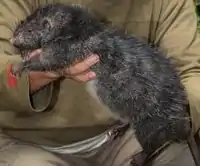Mallomys
Mallomys is a genus of rodent in the family Muridae.[1] The name of the genus is formed from the Greek μαλλός, mallos, wool, and μῦς, mus, mouse/rat. These very large rats weigh between 0.95 and 2 kilograms (2.1 and 4.4 lb) and are native to highlands in New Guinea.[2] Little is known about their behavior, but they are believed to feed on leaves, grasses and other plant material.[2]
| Mallomys Temporal range: Pleistocene to Recent | |
|---|---|
 | |
| Mallomys gunung | |
| Scientific classification | |
| Domain: | Eukaryota |
| Kingdom: | Animalia |
| Phylum: | Chordata |
| Class: | Mammalia |
| Order: | Rodentia |
| Family: | Muridae |
| Tribe: | Hydromyini |
| Genus: | Mallomys Thomas, 1898 |
| Type species | |
| Mallomys rothschildi | |
| Species | |
|
Mallomys aroaensis | |
It contains the following species:
- De Vis's woolly rat (Mallomys aroaensis)
- Alpine woolly rat (Mallomys gunung)
- Subalpine woolly rat (Mallomys istapantap)
- Rothschild's woolly rat (Mallomys rothschildi)
- Bosavi woolly rat (Mallomys sp. nov.)[3]
- Arfak woolly rat (Mallomys sp. nov.)
- Foja woolly rat (Mallomys sp. nov.)
Conservation International (CI) and the Indonesia Institute of Science (LIPI) discovered two possibly undescribed mammals upon visit of the Foja Mountains in June 2007: a Cercartetus pygmy possum, one of the world's smallest marsupials, and a 1.4 kilograms (3.1 lb) Mallomys giant rat (five times the size of a Brown Rat) - found in Indonesia's Papua in 2005.[4]
References
- Musser, G.G.; Carleton, M.D. (2005). "Superfamily Muroidea". In Wilson, D.E.; Reeder, D.M (eds.). Mammal Species of the World: A Taxonomic and Geographic Reference (3rd ed.). Johns Hopkins University Press. pp. 894–1531. ISBN 978-0-8018-8221-0. OCLC 62265494.
- Flannery, T. (1995). Mammals of New Guinea. Pp. 284-291. ISBN 0-7301-0411-7
- BBC News 2009-09-06: Giant rat found in 'lost volcano' http://news.bbc.co.uk/earth/hi/earth_news/newsid_8210000/8210394.stm
- Afp.google.com, Two new mammals found in Indonesian 'lost world': green group Archived 2007-06-09 at the Wayback Machine